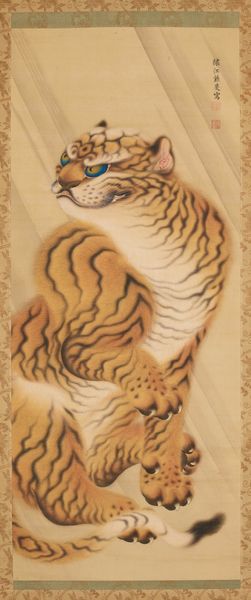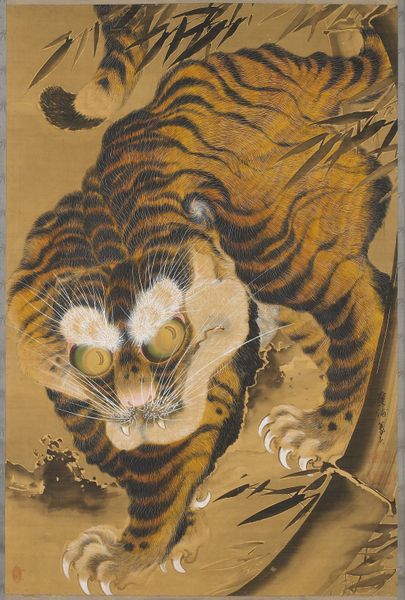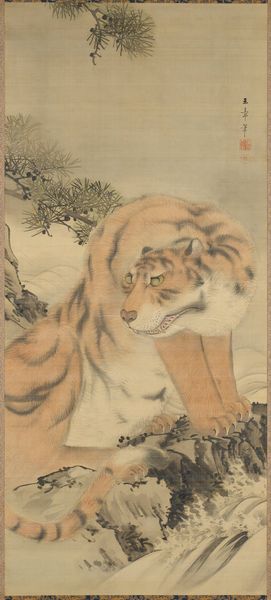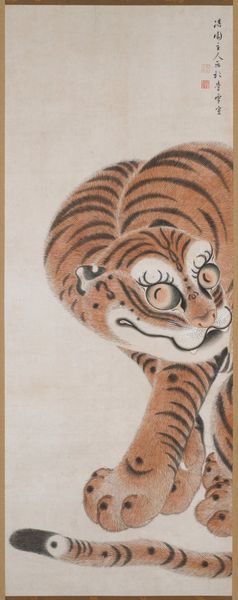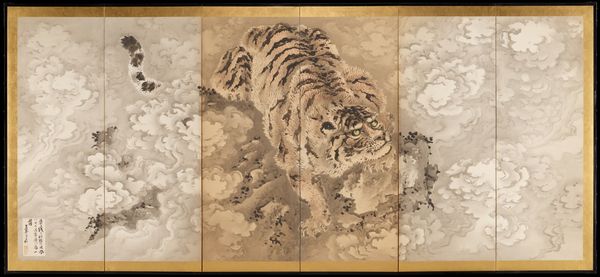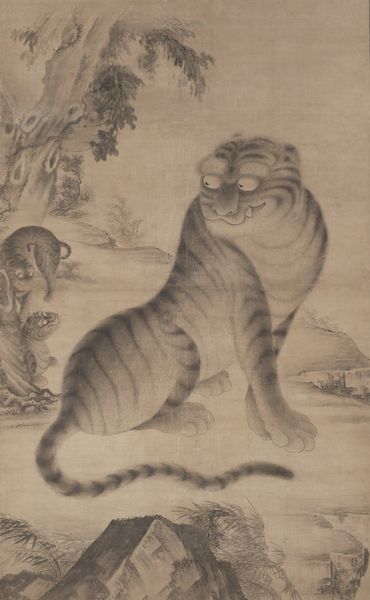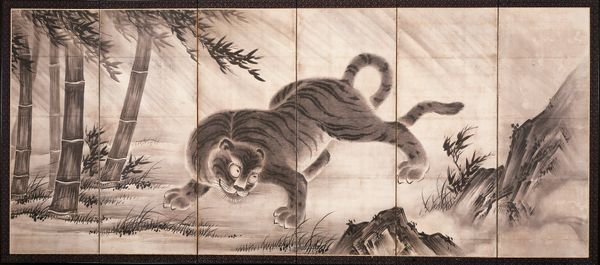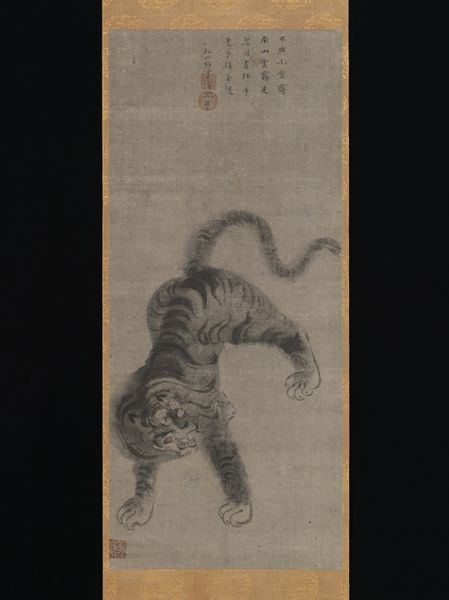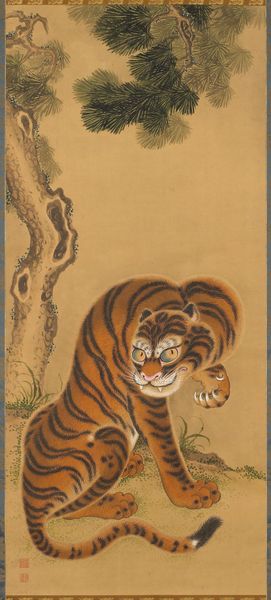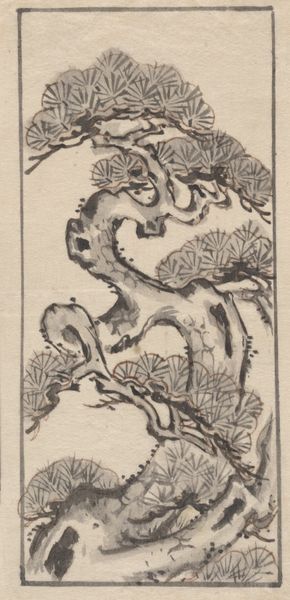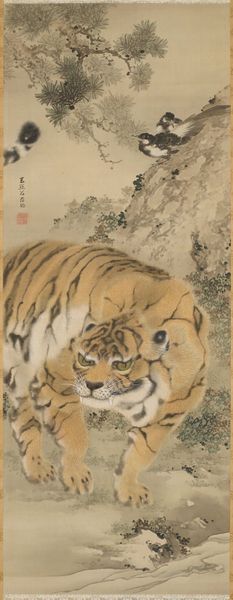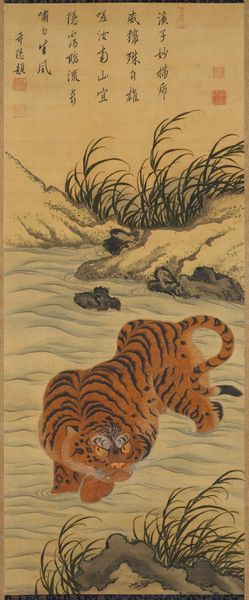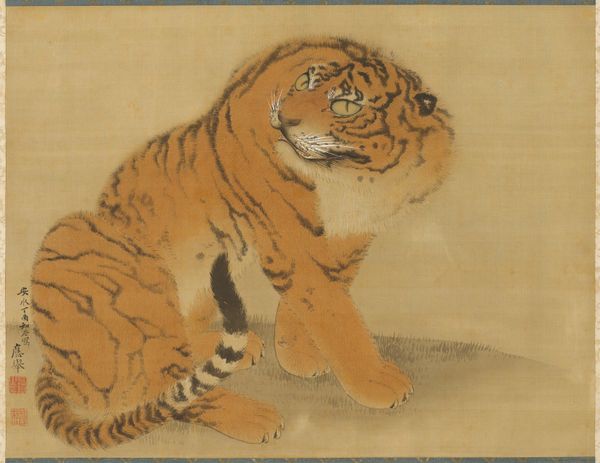
painting, paper, hanging-scroll, ink, color-on-paper
#
aged paper
#
toned paper
#
animal
#
painting
#
asian-art
#
landscape
#
japan
#
paper
#
hanging-scroll
#
ink
#
color-on-paper
#
watercolor
Dimensions: 58 1/2 x 55 in. (148.59 x 139.7 cm) (image)108 1/2 x 63 in. (275.59 x 160.02 cm) (without roller)
Copyright: Public Domain
Curator: Before us, we have "Tiger Emerging from Bamboo," a hanging scroll painting attributed to Kano Tsunenobu, created in the early 18th century. The artwork is done with ink and color on paper. Editor: The first thing that strikes me is how… vulnerable the tiger looks. The almost comical, wide-eyed expression seems at odds with the animal’s typical representation as a symbol of power. Curator: Precisely. Observe how the artist used washes of ink to create a soft, almost ethereal effect, particularly in the rendering of the bamboo and the animal’s fur. The composition focuses intently on form, with less attention devoted to spatial depth or contextual setting. Editor: Right, but that contrast also suggests the tiger's delicate position, maybe its confrontation with human encroachment and environmental shifts. We could consider this in terms of Tokugawa Japan, a society marked by urbanization, rigid class structures, and growing environmental concerns. Curator: Indeed, and while you analyze historical factors, let's not ignore how the subtle variations in tonality produce a layered and sophisticated composition. Notice the strategic use of negative space. The blank background forces our attention onto the essential forms. Editor: But even formal components can bear political meaning. The tension in the tiger’s posture, emphasized by its forward lean, can be a reference to those in Japanese society living precariously between tradition and the modern era. Curator: Perhaps. Ultimately, whether viewed as pure aesthetic form or cultural commentary, the success lies in its carefully calibrated visual components—the ink, the brushstrokes, the tonal variations, which construct a compelling image. Editor: I agree. And I think what makes this piece enduring is its invitation to look beyond aesthetics to consider broader implications. Even the gentlest images can carry forceful meanings.
Comments
minneapolisinstituteofart about 2 years ago
⋮
Tigers as a subject for painting became popular among Japanese artists as early as the 15th century when Chinese examples were brought to Japan. Within Zen monasteries, they became symbols of the earthbound spirit and were often paired with images of dragons, emblems of the soaring enlightened spirit. Among Japan's military elite, they were symbols of power, and artists often painted them among thick trunks of bamboo, a plant admired for its strength and resiliency. Within the context of an impressive reception hall, such large scale paintings contributed to the grandeur of the setting. Since tigers were not native to Japan, artists had to conjecture how they actually looked based on imported hides. As a result, they often appear to be overgrown domestic cats. As a teenager Kano Tsunenobu succeeded his father Naonobu (1607–1650) to become head of the Kobikichō atelier, the highest ranking of several branch studios of the prominent Kano House of painters. As such, Tsunenobu served as painter-in-attendance (goyō-eshi) to the ruling Tokugawa shoguns in the Japanese capital Edo (now Tokyo). One of the foremost painters of his day, Tsunenobu was also known for his vast knowledge of old Chinese and Japanese paintings and was widely active as an authenticator.
Join the conversation
Join millions of artists and users on Artera today and experience the ultimate creative platform.
